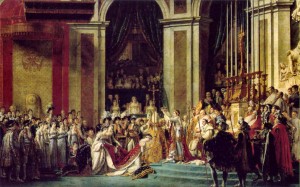A difficult lead quiz. Continue reading
This fascinating hand came up in the sectional pairs game in Guilford on Saturday. This was your hand:
| RHO | You | LHO | Partner |
| 1♣ | 4♥ | 4NT | 5♥ |
| 6♦ | P | 6♠ | P |
| P | P |
Here are two clues:
- When you ask LHO about the 6♦ bid, the reply is “I don’t know. Maybe it shows one ace; maybe it shows a diamond suit.”
- You have an extremely reliable partner (me) You can count on him to hold three hearts.
What would you lead?
These grades are based on results as the cards lay on this specific hand, not scientific study or expert analysis.
-
- If you led a black card, you get an F. The opponents had four singletons! RHO can pitch his losing heart on LHO’s ♣AK, or he can pitch LHO’s losing heart on his own ♦AQ if he takes the finesse after drawing trump. Thirteen tricks are not difficult to find.
I suppose that that partner might have had the ♣A, but even so, why not lead the ♥A before trying that gambit? I can see no reason whatever to lead a spade to cut down on ruffs. You, after all, are the one with the void.
- If you led a black card, you get an F. The opponents had four singletons! RHO can pitch his losing heart on LHO’s ♣AK, or he can pitch LHO’s losing heart on his own ♦AQ if he takes the finesse after drawing trump. Thirteen tricks are not difficult to find.
-
- If you led the ♥A, you get a C. The opponents make the bid with no overtrick. No other result is conceivable as the cards sit.
-
- If you led any heart beside the Ace or Queen, you also get a C. Your partner is reliable, but he is not a mind-reader. As it happens, RHO does have a six-card diamond suit, and LHO has a singleton. Your partner and the dummy have nine clubs between them and only seven diamonds. It would be asking a lot to expect partner to find the magic diamond return after he wins the first trick with the ♥K.
- The winner as the cards lie is the ♥Q. It relies on partner to figure out that he must overtake, but the startling nature of the lead might serve to rouse him from his customary revery. Once he makes that move, he should be capable of leading back a diamond rather than a club.
Of course, if partner does not have the ♥K, underleading the Ace would be a terrible play. So, it is worthwhile to analyze the probabilities. You can see eight hearts under your thumb, and partner has claimed three. The opponents therefore have two between them. The chances of partner having the King is therefore 60%. Do not bother to take into account the fact that two of the missing cards are honors. I am very familiar with your partner’s style, and I assure you the he would bid 5♥ with any three hearts.
Do you need to take into account whether one of the opponents has a void? Well, it seems obvious that declarer would ruff any heart lead unless there was absolutely no other potential way to make the contract except to play you for the ♥A. Therefore, if one of the opponents has a void in hearts (48% chance), a heart lead seems unlikely to do much harm, and it is hard to imagine that any lead helps much.
If we assume that partner is astute, the chance of the ♥Q producing two tricks is 31.2%. The chance of it forfeiting the heart trick is 20.8%. If partner has the ♣A, leading the ♥A is probably the best choice. However, given the bidding, I would assess that probability as negligibly small. If partner does not have that card, no other lead has a reasonable chance for success.
I flatter myself to think that I would have set the romantic lady on the table and rubbed my hands in glee when my doppelgänger partner overtook and returned a diamond for down one.
Incidentally, twelve pairs played in 6♠. They all made the contract, two with an overtrick. One pair bid and made 7♠. I bet that there was a heated exchange between the defenders after that result. I do not know what the bidding was at any of these tables. The player holding your hand may not have known that his partner held three hearts.




